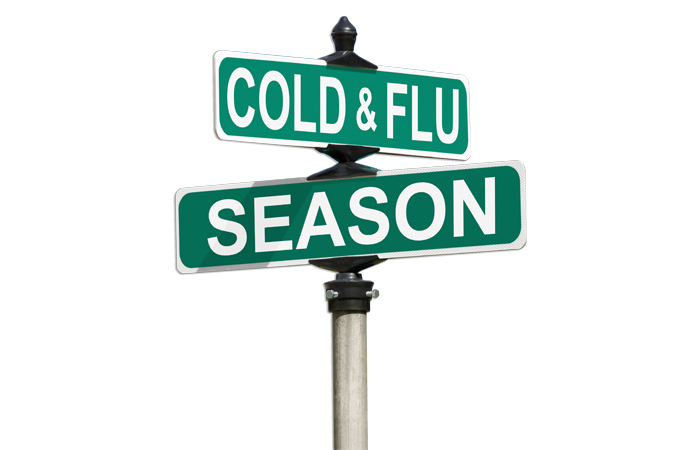In OTC
Follow this topic
Bookmark
Record learning outcomes
It’s the time of the year when cough, cold and flu symptoms dominate health conversations. Pharmacy teams are likely to experience an influx of customers with questions about identifying and managing common winter viral infections.
“It will come as no surprise that colds and coughs are common illnesses in the winter season and are ailments that many customers will seek support for from a pharmacy team,” says Lucy Morris, Numark patient services manager.
“Apart from recommending paracetamol and ibuprofen to manage symptoms such as aches, pains and fevers, pharmacy teams should ensure they can confidently link to other products to provide relief for a cold or cough,” she says. “This is a great way to link sell, so pharmacists should consider promoting products such as nasal inhalers, throat lozenges and pocket tissues.”
Cough it up!
Most winter coughs triggered by a viral infection will clear up on their own (without antibiotics) within three to four weeks. However, these coughs can be irritating and potentially debilitating, even leading to sleepless nights, fatigue, depression and stress incontinence. Occasionally, a viral cough can lead to acute bronchitis, so severe or ongoing coughs should be assessed by a doctor (see box on page 14 for more on chronic cough).
Dry or non-productive acute coughs (lasting up to three weeks) are usually triggered by a tickly sensation in the throat, and regular coughing may also make the throat sore. A chesty cough is usually caused by congestion in the airways, due to a build-up of phlegm or mucus, making the chest feel heavy or tight.
When it comes to treatment, it may take trial and error for pharmacy customers to find what works best for them. Some people find that raising the head end of their bed helps to limit a chesty cough, while drinking plenty of fluids or sucking sweet lozenges may help to soothe a tickly throat. It is advisable to avoid smoking as this can make a cough worse.
The NHS recommends the following first-line management options for an acute cough:
- Take paracetamol or ibuprofen to treat any pain
- Take hot lemon and honey (not suitable for babies under one year due to the risk of botulism and because it is a sugar and may cause tooth decay)
- Take a herbal medicine called pelargonium (for people aged 12 and over).
Pharmacy customers can also try a cough syrup, cough medicine or cough lozenges containing an expectorant or a cough suppressant, although these won’t stop a cough completely. According to National Institute for Health and Care Excellence (NICE) guidance on managing acute coughs (published in February 2019), decongestants, antihistamines and cough medicines containing codeine are unlikely to help an acute viral cough at all.
“Coughs should resolve in a couple of weeks,” says Sue Snelling, Oxford Online pharmacy manager. “There are a range of mixtures that can help dry or chesty coughs and a herbal product that helps both types of cough. If a cough lasts for more than three weeks or a high temperature develops, then a GP should be seen.”
Keeping a cold at bay
Most adults get two to three colds a year, whilst children usually catch between five to eight colds in the same period. Colds can be caused by over 200 different viruses, including rhinoviruses, respiratory syncytial virus (RSV), adenoviruses, non-Covid coronaviruses and even influenza. Those caused by rhinoviruses tend to be most prevalent in the autumn and winter months.
The wide range of cold viruses has so far prevented the development of a vaccine against the common cold. However, prevention is still key. Colds can be spread by touching contaminated surfaces (the viruses can live on hands and surfaces for 24 hours) as well as through coughs and sneezes that spread the viruses into the air. Someone with a cold can start spreading it from a few days before their symptoms begin until their symptoms have finished, whilst some people can remain infectious for several weeks.
To reduce the risk of spreading a cold, customers should:
- Wash their hands regularly with warm water and soap (or use a suitable hand gel)
- Use tissues to trap germs when coughing or sneezing
- Throw used tissues into a bin as quickly as possible
- Not share household items (e.g., towels or drinking glasses) with anyone who has a cold
- Keep rooms ventilated by opening a window/door if possible.
Most colds are mild, causing a blocked or runny nose, sneezing, sore or irritated throat and cough. The symptoms tend to come on gradually and peak after two to three days. Some people may also have a slight fever, headache and muscle aches, and occasionally a loss of taste and smell. Colds tend to clear up completely after a week or so, but can lead to sinusitis, bronchitis or a middle ear infection in some people.
Pharmacy customers can choose from a wide range of cold remedies to ease troublesome symptoms. They may prefer to tackle each symptom separately (e.g., a blocked nose or a sore throat) or use an all-in-one cold medicine (which often contains either paracetamol or ibuprofen with a decongestant).
It’s important to remind customers not to use all-in-one medicines if they are already taking paracetamol or ibuprofen tablets separately, or they may unintentionally overdose on the ingredients.
Customers can try the following management approaches to ease their symptoms:
- Painkillers to help lower a fever and ease aching muscles
- Decongestant sprays or tablets to relieve a blocked nose – remember to check suitability according to age and any underlying medical conditions
- Gargling with salt water or sucking medicated throat lozenges (containing a local anaesthetic and NSAID or an antiseptic) to provide temporary relief from a sore throat
- Steam inhalation, vapour rubs and saline nasal drops/sprays to ease a blocked nose.
Flu season
Flu (influenza) usually occurs in the UK between December and March. There are three types of flu virus – influenza A tends to be the most severe and often leads to outbreaks and pandemics, influenza B tends to be less severe but may cause local outbreaks, while influenza C usually causes milder cold-like symptoms.
This year is expected to be a significant flu season, with a “twindemic” of rising Covid and flu cases. According to an article published in The Lancet in August, there was a rapid rise in influenza A in Australia earlier in 2022. This data usually helps to predict what’s going to happen in the northern hemisphere in the winter months.
There have been few flu infections over the last two years, which means herd immunity is much lower than it has been in previous years, and most children under the age of two years haven’t been exposed to flu viruses at all. Towards the end of last month, the UK Health Security Agency reported that cases of flu were rising, along with associated hospitalisations.
The only silver lining is that some research suggests that a recent Omicron Covid infection may provide some protection against a severe influenza A infection. “There’s strong evidence that catching the latest Omicron variants of Covid can protect you from serious influenza,” says Dr Quinton Fivelman PhD, chief scientific officer at London Medical Laboratory. “That doesn’t apply to previous Covid variants such as Delta. It seems a response from the body caused by fighting the Omicron variant also stops the influenza virus from replicating. However, that doesn’t mean that we should consider Omicron to be in any way safer or somehow preferable to influenza.”
One of the main ways to tackle a flu pandemic is to encourage flu vaccinations in all ‘at risk’ groups. According to The Lancet, public attention has focused more on Covid-19 and the autumn Covid boosters, so there now needs to be a stronger focus on flu jabs, especially in minority ethnic groups. Many people have, for example, been encouraged to book both jabs at the same time.
This year, the UK Joint Committee on Vaccination and Immunisation (JCVI) removed adults aged 50-64 and children aged 11-15 years from the groups eligible for a free flu jab, but the other ‘at risk’ groups remain the same as last year.
“GPs are encouraging everyone who is eligible for a free flu vaccine and a Covid-19 booster to take up the offer as soon as possible,” says Dr Hana Patel, clinical GP and honorary lecturer at the University of Kent, “and to share that people can book this online on the Government website. We are worried about the pressure on the NHS, but there are ways that people can be proactive and protect their health and others around them.”
It isn’t always easy to distinguish mild flu from a bad cold, as they can cause similar symptoms. However, according to Lucy, there are some key differences to look for. “It is important that pharmacy teams can recognise the different symptoms to be able to advise patients correctly,” she says. “Flu is much more serious and can even be life threatening. Flu symptoms include exhaustion, high temperatures, headaches, and dry or chesty coughs.”
Management approaches for flu include:
- Getting plenty of rest and drinking plenty of fluids
- Staying off work or school until people feel better
- Taking paracetamol or ibuprofen to lower a fever and reduce muscle aches and pains
- Using suitable cold and flu medicines to treat specific symptoms, such as nasal congestion or a cough.
Flu is most likely to cause complications in babies and young children, pregnant women, older people and those with chronic health conditions.
The most common complications include acute bronchitis, worsening asthma, middle ear infections, sinusitis and pneumonia.
Very occasionally, flu can lead to heart problems and complications affecting the nervous system (such as meningitis or encephalitis).


